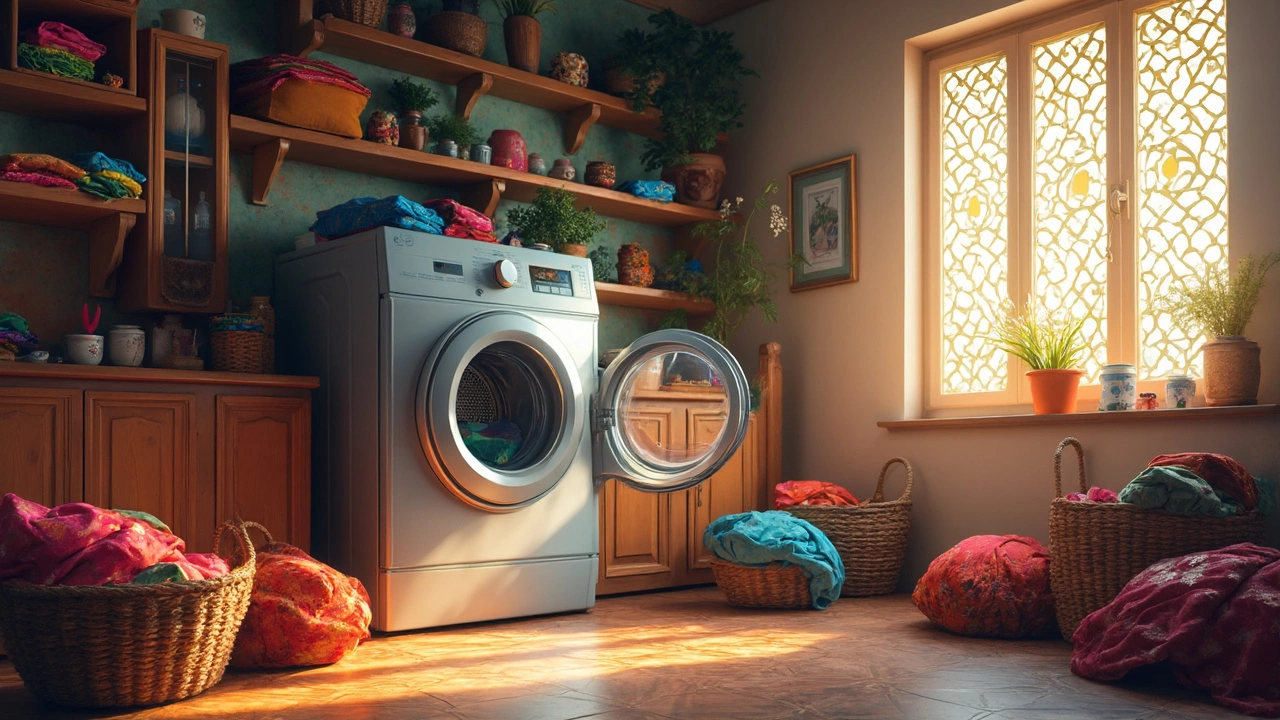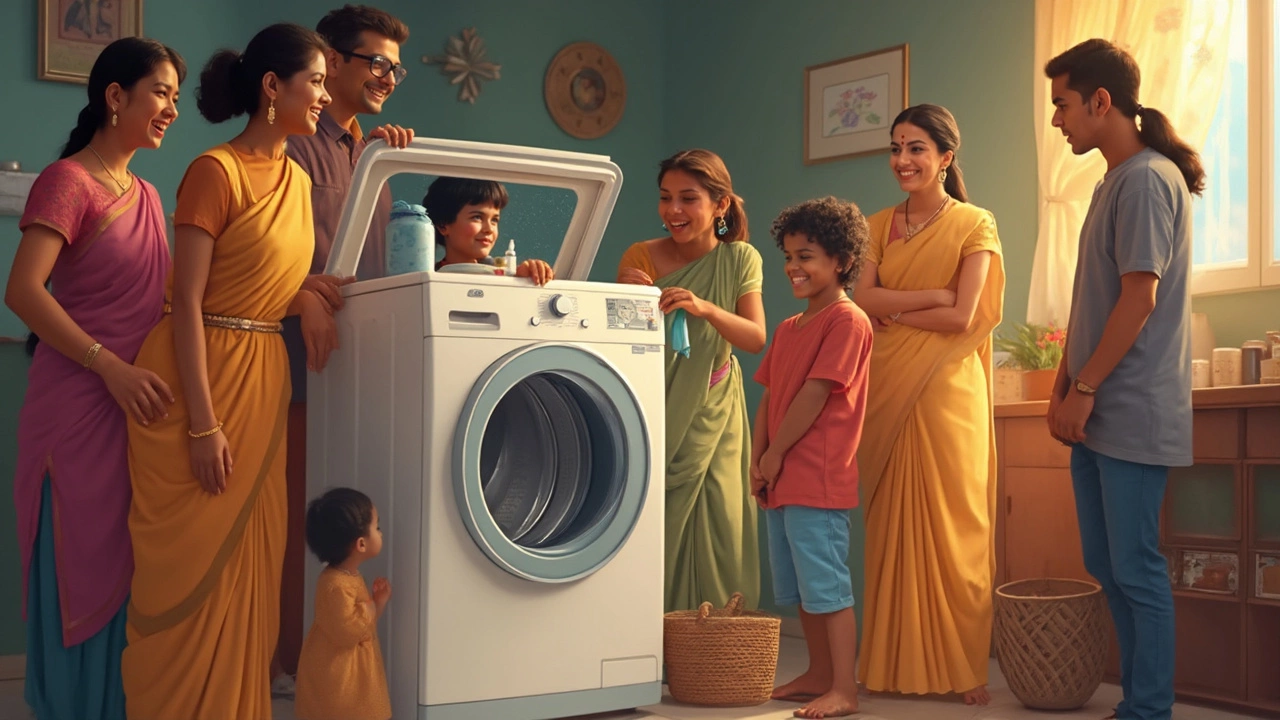
We all know the feeling: standing in front of a pile of laundry that looks like a mini mountain and wondering if your washing machine can handle it. It's no secret, when it comes to tackling heavy loads, not just any washing machine will do. You need one that won't break a sweat, or more importantly, break its motor.
Let's talk about size first. The drum capacity of your washer is the deal-breaker here. If you're regularly dealing with loads of over 5 kg, you'd want to look at machines with at least a 10 kg drum. Trust me, this is no place to skimp.
Then there's the choice between top-load and front-load washers. Front-loading machines are known for their stunning efficiency—both water and energy. They’re also easier on fabrics. But top-loaders? They're often quicker and might be less of a workout on your back. Each has its perks; it really boils down to personal preference and the layout of your laundry space.
Capacity Matters
When it comes to washing machines, drum capacity isn’t just a number—it's a game-changer, especially for those managing constant heavy loads. So, what should you be aiming for? Well, most families find a washing machine with a drum size of 7 kg to 10 kg hits the sweet spot. That’s enough to hold several towels, duvet covers, or a whole week’s worth of clothes for a family of four.
Bigger isn’t always better, though. Say your loads are smaller during weekdays or you like to wash delicates separately—you might want to consider a variable-load or sensor-equipped washer. These washing machines can adjust water and energy usage based on load size. So, if you’re not stuffing that drum to its limits, you won’t be wasting resources.
How to Choose the Right Size
- Count Heads: More people generally mean more laundry. Have a large family or roommates? Consider stepping up to an 11 kg model.
- Space Check: Make sure your laundry nook can accommodate a larger washing machine. Measure twice, install once.
- Hauling Habits: Do you tend to save laundry for one big weekend load? Or wash small bundles daily? Your habits dictate your capacity needs.
If you are someone who frequently handles heavy loads due to a job, like a gym trainer or chef, consider a machine that’s designed for commercial use or high frequency. These beasts don’t just do the job—they’re built to withstand constant action. But yes, they do cost a bit more upfront.
| Drum Capacity | Suggested Use |
|---|---|
| 6 kg | Single or couple households |
| 7-8 kg | Small families |
| 9-10 kg | Ideal for larger families |
| 11 kg and above | Perfect for very large families or commercial use |
Always match the capacity with your needs to prevent underloading (which wastes energy) or overloading (which stresses the machine), ensuring that your washing machine operates smoothly for years to come.
Top Load vs. Front Load
When you’re looking to purchase a washing machine that handles heavy loads, the big question is: top load or front load? Both types have their pros and cons, so let’s break it down and see what works best for you.
Top Load Washers
Top loaders have been a favorite in many households for years. They’re easy to use—no need to bend over to load and unload your laundry. Most of them also let you add extra items mid-cycle, which can be a lifesaver if you’re prone to finding stray socks after you’ve already hit start.
One thing to watch out for is the agitator, which some top loaders have. It can be a bit rough on delicate fabrics, but it does a solid job stirring heavy loads to get them clean. Plus, these machines often have quicker wash cycles, saving you time—a major bonus if you're in a rush.
Front Load Washers
Front loaders are like the eco-warriors of the washing machine world. They use less water and energy, thanks to their tumbling action, which is gentler on clothes. This makes them a great choice for getting those energy bills down and for washing large loads without fear of damage.
These washers usually come with more tech-savvy features, too, for a more customized wash. The downside? They can take up more space since they need room to open the door, and let's be real—who loves squatting to grab clothes?
| Feature | Top Load | Front Load |
|---|---|---|
| Water Usage | More | Less |
| Cycle Time | Shorter | Longer |
| Initial Cost | Lower | Higher |
When choosing between these two, consider where your priorities lie. Need speed and ease? Top load’s your pick. Looking to save some cash on bills and be kind to the planet? Go for the front load. Either way, there’s a perfect washer out there ready to tackle those heavy loads without a hitch.

Energy and Water Efficiency
When you're handling those monstrous laundry loads, the last thing you want is a machine that guzzles energy and water like it's no big deal. Thankfully, a lot of modern washing machines come packed with features that aim to be kinder to both the environment and your wallet.
Why Efficiency Matters
Every time you run a load, you're using up electricity and water. By picking a washing machine that's efficient, you're not just slashing your bills—you’re also doing a bit to help out Mother Earth. Most models these days come with Energy Star ratings, which means they meet certain standards for energy consumption.
Features to Look Out For
- Adaptive Load Sensing: Some washers adjust the water level based on how much is inside, ensuring no drop goes wasted.
- High-Speed Spin Cycles: Higher-speed spins extract more water from your clothes, reducing drying time and energy use.
- Cold Wash Settings: Washing with cold water can dramatically cut electricity use since a significant chunk of energy goes into heating water.
So, how do washers actually compare? Here's a quick peek:
| Washer Type | Average Energy Use (kWh) | Average Water Use (Liters) |
|---|---|---|
| Front-Load | 85 kWh/year | 50 L/load |
| Top-Load (with agitator) | 120 kWh/year | 64 L/load |
| Top-Load (without agitator) | 95 kWh/year | 56 L/load |
Notice how front-load washers tend to leave a lighter footprint? This is why many experts consider them the better option for energy and water conservation.
Smart Choices, Smart Savings
It's worth keeping an eye out for models that offer both tub cleaning cycles and usage reports. These nifty features not only help maintain the machine but also provide insights into your usage patterns, helping you further optimize energy and water consumption.
In the end, while these efficient washing machines might be a bit more upfront, they'll likely save you heaps in running costs over time. Plus, the planet gets a breather too—win-win!
Maintenance and Care Tips
Keeping your washing machine in top shape isn’t just about enhancing its lifespan; it’s also about making sure it can handle those heavy loads efficiently. Let’s break down some easy-peasy tips to extend the life of your trusty laundry sidekick.
Regular Cleaning
First up, clean your washer! Sounds obvious, but it’s often overlooked. Every month or so, run an empty cycle with hot water and a cup of vinegar. This helps nab any residue or mold that might be hiding out. Just make sure no one throws a pair of socks in at the last second!
Check the Hoses
Word to the wise: check your hoses regularly for cracks or leaks—an easy way to avoid unexpected floods in the laundry room. Experts suggest replacing these hoses every five years. Think of it as an investment in your home’s well-being.
Mind Your Loads
Resist the urge to shove in that last towel to save a rinse cycle. Overloading might seem like a clever move, but it can cause strain on the drum and motor. The result? More frequent repairs and a stressed-out washer. Opt for recommended load limits instead.
Balanced is Best
Uneven loads can make your machine dance around the laundry room—a sure sign of trouble. If this happens, stop the wash and redistribute the clothing. This prevents damage and keeps your washer running smoothly.
Leave the Door Ajar
After a wash, leave the door or lid open to let the drum dry out. This minor habit can help prevent mold build-up and keep that funky, musty smell at bay.
Keep these tips in mind, and your washing machine should stay as reliable as your favorite pair of jeans. Consistent maintenance means when it's time to wash those big loads, you can count on your machine to get the job done without skipping a beat.